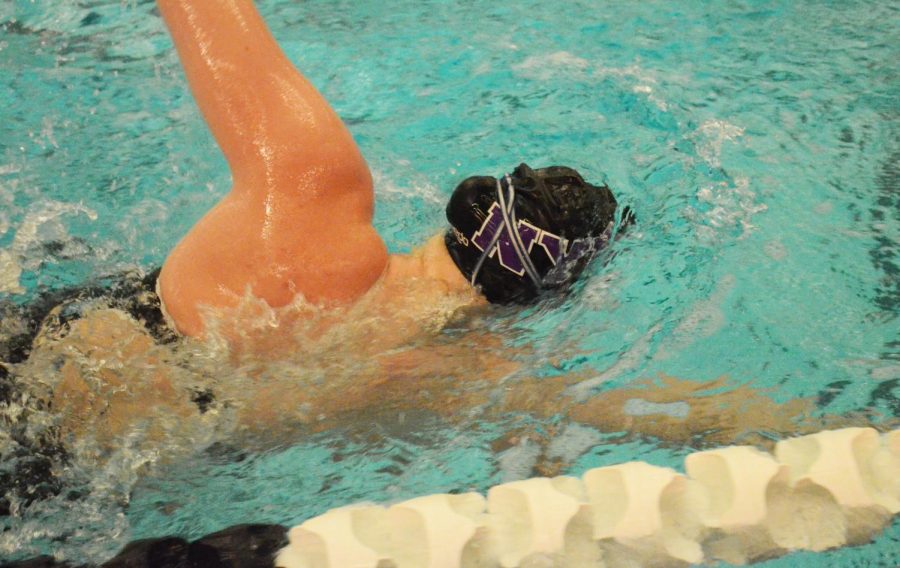The Hidden Injuries of Athletes
An NYU swimmer at the 2018 S & D Senior Ceremony on Jan. 27.
April 9, 2018
All athletes must be mentally tough to compete at the highest level. But student-athletes are also young adults and face the same gamut of mental health issues as other adolescents.
Stern first-year and basketball player Reiko Johnson said she has personally dealt with her share of battles with mental wellness as a student-athlete.
“Being a student-athlete definitely has mental tolls on you,” Johnson said. “I have not had major mental health concerns during my time as a student-athlete, but I have had minor mental challenges. My experiences are from not meeting personal expectations during games and practices, and certain outcomes that I thought [were] going to happen.”
Tandon junior and swimming and diving team member Claire Liu added that the time commitment of being a student-athlete has taken a toll on her mental wellness.
“Being a student-athlete sometimes feels like you are always at war with your self-doubts, insecurities and fears,” Liu said. “The biggest pressures are caused by the time constraints imposed by playing a sport and constant expectation to perform. I have spent so much time in the pool that I don’t necessarily feel integrated to my school and since I have been Tandon’s first and only diver, I felt extremely isolated and alone. Because the majority of our athletes practice off of the NYU campus, we are all very much on completely different schedules and there is little space for integration.”
Cassie Steinberg, a current graduate student in Clinical Nutrition at NYU and dietetic intern at New York Presbyterian Brooklyn Methodist Hospital, spent four years as a member of the NYU women’s soccer team while pursuing her undergraduate studies in Nutrition and Dietetics. While competing for the Violets, Steinberg said she observed the mental health concerns she learned about in the classroom on the field.
“I would say I definitely became much more aware of mental health concerns in my teammates in my junior and senior year, once I was further along in my degree and had developed my interest in nutrition and health,” Steinberg said. “I definitely noticed a good amount of stress, anxiety and depression. Not necessarily full-fledged eating disorders, but a lot of broad image concerns, and obsessions with looking a certain way and eating healthy, and talking about food all the time.”
Competitive sports can do great things for athletes — they increase health, boost self-esteem and teach leadership and teamwork skills. However, Steinberg mentioned that some sports can put athletes at an increased risk for eating disorders.
“There’s a significantly higher prevalence of eating disorders in aesthetic based sports,” Steinberg said. “So, in gymnastics, swimming, running, cheerleading, wrestling — your body plays such a huge role in your identity. Your body is literally your vessel for performance and success, so you place so much emphasis on making sure it’s perfect. Sometimes it can become an addiction or an obsession to an unhealthy extent where you start developing bad habits in an attempt to make your body into something you think it’s supposed to be.”
Liu said she has seen the impact of eating disorders play out in the world of diving.
“In the sport of diving and many other acrobatic sports, smaller physiques are more desired,” Liu said. “I have not been diagnosed with an eating disorder, but I know that I have spent most of my life to get skinnier by trying extreme fad diets and exercise plans. I have met many divers who have struggled with weight — it could be as nonchalant as skipping meals for half the day in order to not feel bloated before a competition or practice, to being diagnosed with anorexia or other eating disorders. Diving does not necessarily burn that many calories, so it makes sense why some divers would take matters into their own hands and restrict their caloric intake.”
Providing support and education is a crucial part of decreasing the mental health issues that plague student-athletes. In recent years, the National Collegiate Athletic Association has recognized the increasing prevalence of mental illness among college athletes and created the NCAA Mental Health Task Force to provide student-athletes with more information and resources about the interconnectedness of mind, body and sport, including a Mental Health Best Practices guide on its website.
Additionally, professional athletes such as NBA player Demar DeRozan and MLB player Mike Marjama have opened up and spoken publicly about their struggles with mental illness and eating disorders, which Johnson said could help student-athletes realize that they are not alone.
“It’s important because it shows that very successful athletes, that seem like they wouldn’t have any struggles with mental health, actually struggle just like everyone else,” Johnson said.
We should always remember that athletes are more than just athletes. They are people who go through their own daily struggles, just as we all do, and require support and love at every turn.
A version of this article appeared in the Monday, April 9 print edition. Email Bela Kirpalani at [email protected].



























































































































































